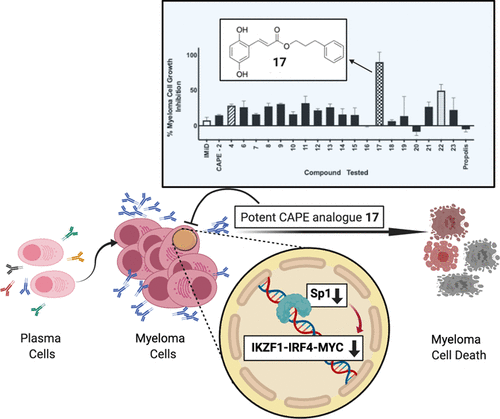当前位置:
X-MOL 学术
›
J. Nat. Prod.
›
论文详情
Our official English website, www.x-mol.net, welcomes your feedback! (Note: you will need to create a separate account there.)
Antimyeloma Potential of Caffeic Acid Phenethyl Ester and Its Analogues through Sp1 Mediated Downregulation of IKZF1-IRF4-MYC Axis
Journal of Natural Products ( IF 5.1 ) Pub Date : 2020-11-19 , DOI: 10.1021/acs.jnatprod.0c00350 Alli Murugesan 1, 2 , Grégoire Lassalle-Claux 3 , Lauren Hogan 1 , Elise Vaillancourt 1 , Ayyoub Selka 3 , Katie Luiker 1 , Min Ji Kim 1 , Mohamed Touaibia 3 , Tony Reiman 1, 2, 4
Journal of Natural Products ( IF 5.1 ) Pub Date : 2020-11-19 , DOI: 10.1021/acs.jnatprod.0c00350 Alli Murugesan 1, 2 , Grégoire Lassalle-Claux 3 , Lauren Hogan 1 , Elise Vaillancourt 1 , Ayyoub Selka 3 , Katie Luiker 1 , Min Ji Kim 1 , Mohamed Touaibia 3 , Tony Reiman 1, 2, 4
Affiliation

|
Caffeic acid phenethyl ester (CAPE, 2), a natural compound from propolis, is a well-documented antitumor agent with nuclear factor kappa B (NF-κB) inhibitory activity. Key transcription factors regulated by NF-κB, namely, interferon regulatory factor-4 (IRF4) and octameric binding protein-2 (OCT2), are implicated in the tumorigenesis of multiple myeloma (MM), an incurable bone marrow cancer. Adverse effects and resistance to current chemotherapeutics pose a great challenge for MM treatment. Hence, the structure–activity relationships of CAPE (2) and 21 of its analogues were evaluated for their antimyeloma potential. Preclinical evaluation revealed that CAPE (2) and the 3-phenylpropyl (4), 2,5-dihydroxycinnamic acid 3-phenylpropyl ester (17), and 3,4-dihydroxycinnamic ether (22) analogues inhibited human myeloma cell growth. Analogue 4 surpassed CAPE (2) and lenalidomide in showing strong apoptotic effects with a remarkable decrease in IRF4 levels. The analogue 17 exhibited the most potent anti-MM activity. The downregulation of specificity protein 1 (Sp1) and the IKZF1-IRF4-MYC axis by CAPE (2) analogues 4 and 17 revealed their novel mechanism of action. The analogues showed no adverse cytotoxic effects on normal human cells and exhibited appropriate in silico pharmacokinetic properties and drug-likeness. These findings suggest the promising application of CAPE (2) analogues to target Ikaros (IKZF1)/IRF4 addiction, the so-called Achilles heel of myeloma, for better treatment outcomes.
中文翻译:

咖啡酸苯乙酯及其类似物通过 Sp1 介导 IKZF1-IRF4-MYC 轴下调的抗骨髓瘤潜力
咖啡酸苯乙酯 (CAPE, 2 ) 是一种来自蜂胶的天然化合物,是一种有据可查的抗肿瘤剂,具有核因子 kappa B (NF-κB) 抑制活性。由 NF-κB 调节的关键转录因子,即干扰素调节因子 4 (IRF4) 和八聚体结合蛋白 2 (OCT2),与多发性骨髓瘤 (MM) 的肿瘤发生有关,MM 是一种无法治愈的骨髓癌。对当前化疗药物的副作用和耐药性对 MM 治疗提出了巨大挑战。因此,评估了 CAPE ( 2 ) 及其 21 种类似物的构效关系,以评估它们的抗骨髓瘤潜力。临床前评估显示 CAPE ( 2 ) 和 3-苯基丙基 ( 4)、2,5-二羟基肉桂酸 3-苯丙酯 ( 17 ) 和 3,4-二羟基肉桂醚 ( 22 ) 类似物抑制人骨髓瘤细胞生长。类似物4超过 CAPE ( 2 ) 和来那度胺,显示出强烈的凋亡作用,并显着降低了 IRF4 水平。类似物17表现出最有效的抗 MM 活性。CAPE ( 2 ) 类似物4和17对特异性蛋白 1 (Sp1) 和 IKZF1-IRF4-MYC 轴的下调揭示了他们新的作用机制。类似物对正常人体细胞没有不利的细胞毒性作用,并在计算机上显示出适当的药代动力学特性和药物相似性。这些发现表明 CAPE ( 2 ) 类似物有望应用于靶向 Ikaros (IKZF1)/IRF4 成瘾,即所谓的骨髓瘤阿喀琉斯之踵,以获得更好的治疗结果。
更新日期:2020-12-24
中文翻译:

咖啡酸苯乙酯及其类似物通过 Sp1 介导 IKZF1-IRF4-MYC 轴下调的抗骨髓瘤潜力
咖啡酸苯乙酯 (CAPE, 2 ) 是一种来自蜂胶的天然化合物,是一种有据可查的抗肿瘤剂,具有核因子 kappa B (NF-κB) 抑制活性。由 NF-κB 调节的关键转录因子,即干扰素调节因子 4 (IRF4) 和八聚体结合蛋白 2 (OCT2),与多发性骨髓瘤 (MM) 的肿瘤发生有关,MM 是一种无法治愈的骨髓癌。对当前化疗药物的副作用和耐药性对 MM 治疗提出了巨大挑战。因此,评估了 CAPE ( 2 ) 及其 21 种类似物的构效关系,以评估它们的抗骨髓瘤潜力。临床前评估显示 CAPE ( 2 ) 和 3-苯基丙基 ( 4)、2,5-二羟基肉桂酸 3-苯丙酯 ( 17 ) 和 3,4-二羟基肉桂醚 ( 22 ) 类似物抑制人骨髓瘤细胞生长。类似物4超过 CAPE ( 2 ) 和来那度胺,显示出强烈的凋亡作用,并显着降低了 IRF4 水平。类似物17表现出最有效的抗 MM 活性。CAPE ( 2 ) 类似物4和17对特异性蛋白 1 (Sp1) 和 IKZF1-IRF4-MYC 轴的下调揭示了他们新的作用机制。类似物对正常人体细胞没有不利的细胞毒性作用,并在计算机上显示出适当的药代动力学特性和药物相似性。这些发现表明 CAPE ( 2 ) 类似物有望应用于靶向 Ikaros (IKZF1)/IRF4 成瘾,即所谓的骨髓瘤阿喀琉斯之踵,以获得更好的治疗结果。



























 京公网安备 11010802027423号
京公网安备 11010802027423号